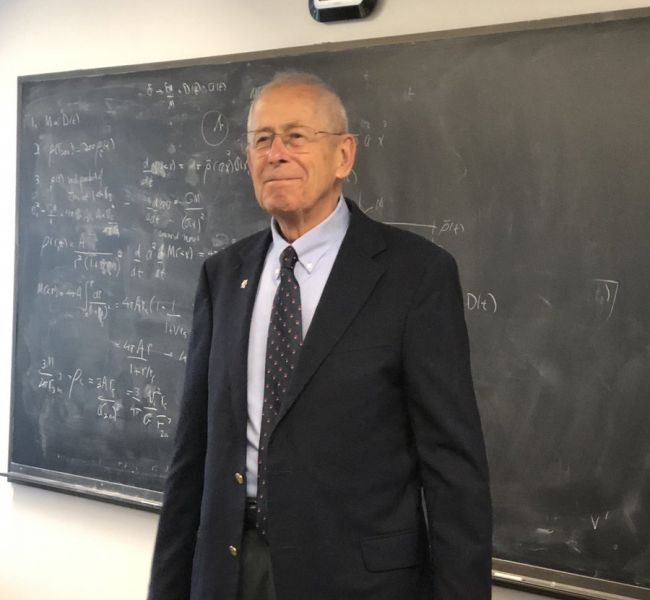Who is Jim Peebles?
Jim Peebles is a Canadian-American theoretical cosmologist, astronomer, and astrophysicist. Jim Peebles is regarded as a founding father of modern cosmology. He is currently the Albert Einstein Emeritus Professor of Science at Princeton University.
Jim Peebles – Birth, Parents, Siblings & Education
On April 25, 1935, Jim Peebles was born Phillip James Edwin Peebles.
In terms of age, he is currently 87 years old. His zodiac sign is Taurus, according to Western astrology.
However, according to some sources, his father worked in the grain industry.
Peebles’ educational background is described as a bachelor’s degree from the University of Manitoba in 1958.
He then went on to study at Princeton University in the United States.
He obtained his doctorate from the same university in 1962.
He stayed, and as a result, he is now a Professor Emeritus of Science.
Net Worth of Jim Peebles? Salary, Earning
Jim Peebles’s predicted net worth in 2022 is around $5 million (USD).
This covers his revenues from research as well as his salary as a university professor.
Furthermore, the specifics of his annual or monthly earnings are unknown.
Facts of Jim Peebles
| Age: | 87 years |
|---|---|
| Birth Date: | April 25, 1935 |
| Horoscope (Sunshine): | Taurus |
| Full Name: | Jim Peebles |
| Birth Place: | St. Boniface, near Winnipeg, Canada |
| Net Worth: | $5 million |
| Nationality: | Canadian |
| Profession: | professor |
| Education: | Princeton University |
Relationship, Married life, Boyfriend/Girlfriend
Alison is Professor Jim Peebles’ wife. They currently reside in Princeton, New Jersey.
Gardening is something the couple enjoys doing together.
They enjoy exploring nature. More information on his personal life and family is conceived.
Body Measurement- Height, Weight, Hair Color
Jim Peebles has average height, weight, and body characteristics, but his specific measurements are not known at this time.
His light skin contrasts with his blue eyes and silver hair.
His eyes were constantly fatigued from his long hours of research, so he had to wear spectacles.
Jim Peebles – Professional Career
Peebles began by researching cosmic microwave background radiation (CMBR) and its relationship to components of The Big Bang Theory.
In 1965, he was hired as an assistant professor at Princeton University.
In 1972, he began working full-time there.
In 1984, he was named the Albert Einstein Professor of Science, and in 2000, he retired as a professor.
Through his research, he demonstrated that the temperature of the cosmos had a significant impact on the amount of helium produced.
He was averse to the idea that heavier chemical components may have been created in the big bang.
In 1970, Peebles and doctoral student Jer Yu investigated the angular power spectrum of the CMB and its relationship to the universe’s matter density.
Later that year, in 1982, he was one of the first cosmologists to recognize the importance of the cold dark matter in the development of galaxies.

Publications
Peebles published an article on the development of galaxies in 1965.
As a result, galaxies are generated as the cosmos expands and cools.
Gravity aids in overcoming the opposing influence of the universe’s intense thermal blackbody radiation.
Peebles’ writings include Physical Cosmology (1971), The Large-Scale Structure of the Universe (1980), and Principles of Physical Cosmology (1981). (1993).
Aside from that, he wrote Quantum Mechanics (1992) and edited Finding the Big Bang (1993). (2009).
Jim Peebles – Social Media Status
He does not have official social media accounts on Twitter, YouTube, Facebook, or Instagram.
However, this does not imply that he is not up to date. He is content to avoid such platforms.
Also Read: Amy Kupps, Melissa Isaac, Helen Hurford, Kristen Holmes
Quick Facts of Jim Peebles
- Jim is currently the Albert Einstein Professor of Science, Emeritus, at Princeton University.
- He won the Nobel Prize in Physics 2019 for theoretical discoveries in physical cosmology.
- Jim became the Albert Einstein Professor of Science in 1984 and a professor emeritus in 2000.
- Through his research, he explained that the temperature of the universe had a great effect on the amount of helium produced.
- Later in 1982, Jim became one of the first cosmologists to bring out the significance of the cold dark matter in the formation of galaxies.




